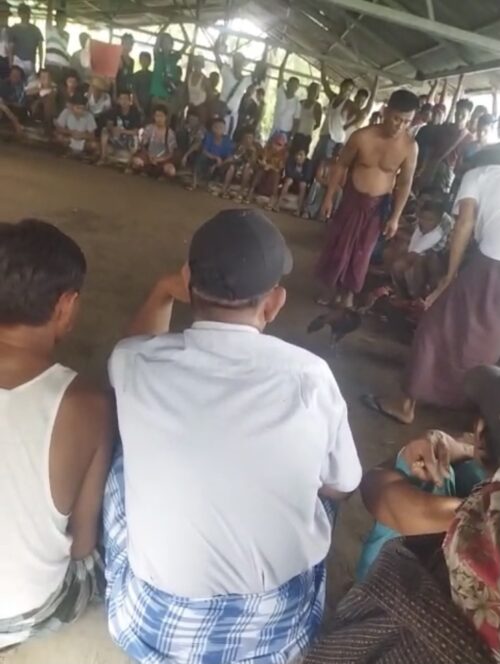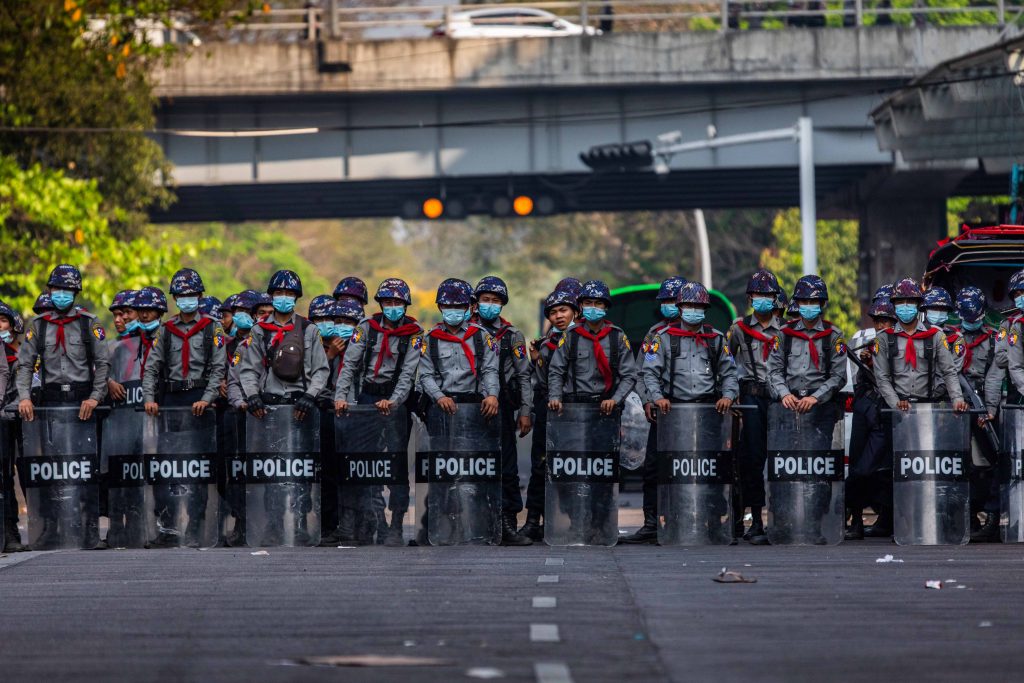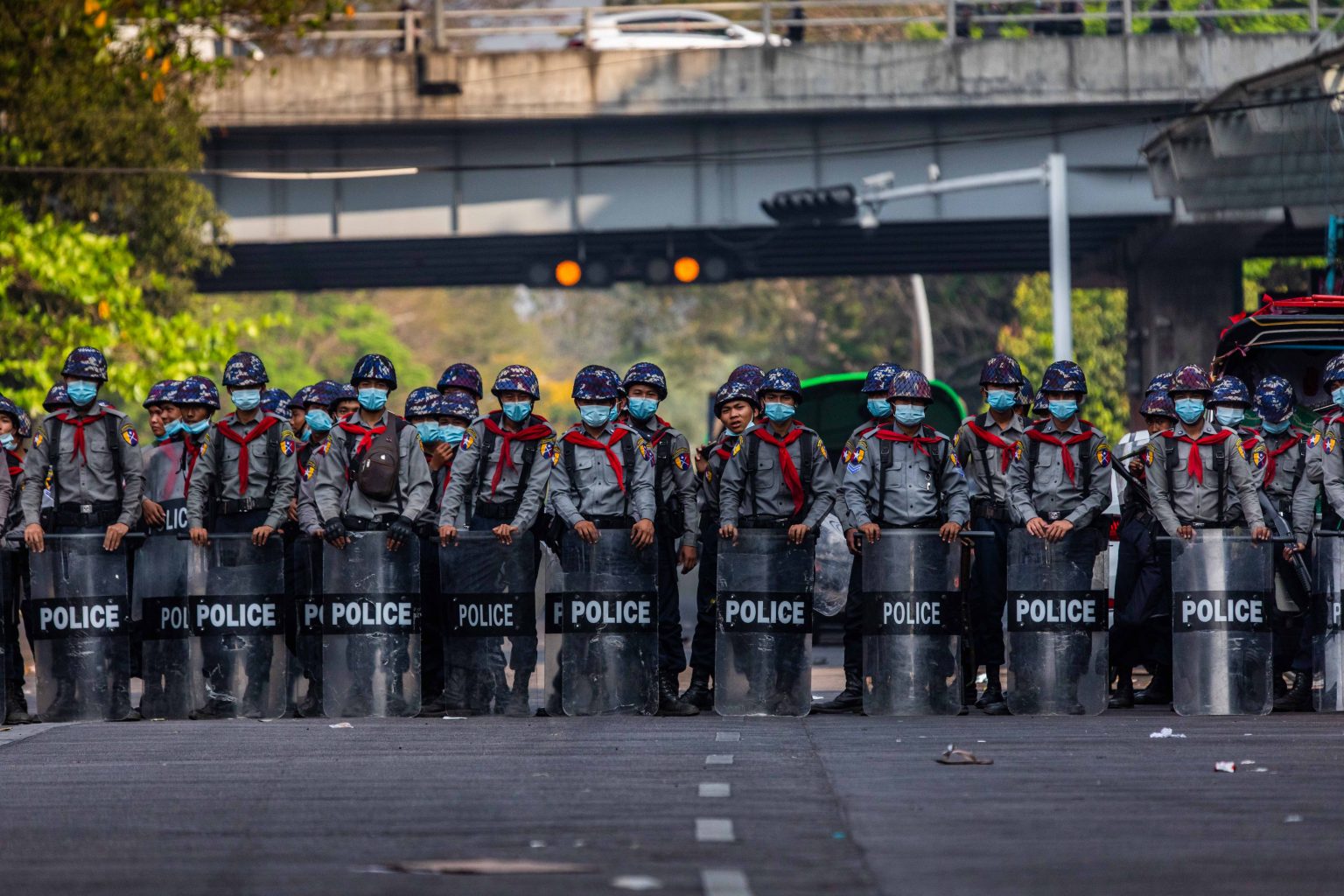Bribes, lawlessness and growing poverty have fuelled a surge in illegal gambling, driving some punters to ruin and despair and sparking local crime waves.
By FRONTIER
The two fighting cocks squared off, their faces already bloody and ripped-out feathers scattered across the ground.
“Fight to win! Advance and fight!” shouted the 50 people surrounding the ring, which was inside a large green tent in Yangon’s outer northern Shwepyithar Township.
“Five in favour of Chate; will anyone take three in favour of Yit?” shouted a young man as other employees kept track of the bets on a ledger.
Ko Than Htay*, a regular cockfighting gambler, explained to Frontier that Chate is a more experienced fighter and favoured to win.
“If a gambler bets K50,000 on Chate and wins, he will take home an extra K30,000. If he loses, he will lose the K50,000,” he said.
At official exchange rate, K50,000 is nearly US$24, but trades for closer to US$15 on the black market.
After 15 minutes of brutal fighting, Yit turned tail and ran, delivering victory to Chate as his supporters cheered and celebrated.
Than Htay pointed out a heavily-tattooed man standing in the centre of the ring, wearing a T-shirt and a pulicat longyi, a lower garment commonly worn by gangsters in Yangon. “He’s the owner of the cockfighting ring,” Than Htay whispered. “He’s a famous gangster in the area. He’s been in prison for murder.”
While Shwepyithar is one of several Yangon townships under martial law, and a nightly curfew and ban on gatherings remains in effect across the city, this hasn’t stopped illegal gambling from flourishing.
“These gambling businesses are operating openly. The stakes are over K10 million,” said Ko Naing Htoo*, a member of a community charity group in the township.
Than Htay said before the military seized power in the February 2021 coup, cock fights were held around once a week, often in remote fields. But now, as rule of law deteriorates under military rule, they occur openly in this gambling hall every day.
“No one will be arrested,” he said. “There are even plans to expand.”
The police have been bribed to stay away while local men are paid K10,000 per day to provide security, according to Naing Htoo.

Risking it all
Gambling for money has long been illegal in Myanmar and the maximum penalty is five years’ imprisonment and a fine of K1 million. Although the 2019 Gambling Law permits it under certain conditions, an accompanying licensing process has not yet been established.
“In the past, gambling dens had to operate in secret but now they do their business openly,” said U Min Thu,* a lawyer in Yangon.
It is much the same story in the heavily fortified capital of Nay Pyi Taw, where illegal gambling is surging right under the military’s nose. There are at least 10 gambling venues in and around the national capital, with one of the most popular dens hidden in a compound in Lewe Township.
“You can’t see anything from the outside, but when we enter the compound it’s like another world,” said Ko Than Zaw,* a 32-year-old who works in the capital and enjoys gambling.
Here, clients can bet on cockfighting, Lay Kong Jin or Ga-loke Ga-loke.
In Lay Kong Jin, the dealer spins a four-sided top with a different animal on each side – a frog, chicken, pig and snake. While the top spins, he covers it with a bowl so the gamblers can’t see, heightening the drama while punters bet on which animal will come out on top.
Ga-loke Ga-loke is named for the sound of dice rattling and also revolves around animals, real and mythical. Betters put down money on a placemat featuring images of different creatures – ranging from a peacock to a winged horse – while three enormous six-sided dice are wedged at the top of a large open briefcase, held up with a stick. The dealer yanks a string connected to the stick, unleashing the dice, which then tumble into the bottom of the briefcase, each displaying an animal image.
“We can bet from K1,000 to several hundred thousand kyat,” Than Zaw said. “It’s like going to a festival, it’s so crowded.”
But while it may feel festive at first, many gamblers quickly find themselves losing everything.
“If gamblers run out of money, we will accept motorcycles, cars, gold and other property as security for loans. The monthly interest rate is 20 percent,” said Nay Pyi Taw money lender Ko Aung Myint.
“When I started playing, it was for fun. Then, I slowly started to lose,” said Nay Pyi Taw resident U Kyaw Lin*, who was forced to sell his teashop to pay off debts he ran up at a gambling den in a housing estate in Zabuthiri Township.
He started going to a casino last November, playing a fish shooting video game popularised in China. At a different venue near the railway station in Shwepyithar, Frontier viewed gamblers playing the same game.
There were around 10 tables featuring the fish shooting game, which locals called the “shark game”, with around 12 people crowded around each machine. Different sea animals swarm across the 42-inch brightly lit LCD table as gamblers shoot at them, gaining money for hits and losing it for misses.
Young women were stationed at each table, taking money from prospective gamblers, who must hand over at least K10,000 to start playing, although most end up spending far more.
“If you lack cash, you can use mobile banking,” explained one employee.
After paying, the money is loaded onto a play card, which is then inserted into the machine.
“This game is like a drug,” said Kyaw Lin, who believes the machines are manipulated to ensure gamblers lose.
“When I lost, I felt that if I won next time, I would get my money back. In the end, I lost about K170 million,” he said. “I don’t want to talk about the casino anymore.”
Aung Myint, the money lender, said a few hundred people gamble in Nay Pyi Taw every day, with more showing up on the weekends.
“Most of them are poor, but rich people also come,” he said. “If they lose, they pawn their motorcycles or rings or other valuables. There is hardly a day when a gambler doesn’t need to pawn something.”
Min Thu, the Yangon lawyer, said the lack of job opportunities and economic malaise since the coup were encouraging desperate people to try their luck at gambling.
“When the economy became tight, many poor people started to gamble in the hope of making easy money, but it ruined their lives,” he said.
Ko Nyi Zaw*, who worked for nearly two years in a gambling den at a housing compound in Zabuthiri Township, said it was not unusual for gamblers to run up losses of hundreds of thousands of kyat.
“The machines are programmed to make a profit and if people come to play without knowing that, they will end up losing and getting into trouble,” he said.

Greased palms and broken neighbourhoods
With illegal gambling taking place so openly, it’s little surprise that police are in the know – and taking a cut.
Aung Myint told Frontier that gambling den owners pay bribes to township and district-level police chiefs so they can run their businesses without fear of arrest or closure.
“The bribe can range from K5 million to K10 million a month,” said Aung Myint, who also claimed police on the payroll would give advance warning before a raid.
Nyi Zaw confirmed these tip-offs, adding that police corruption was contributing to the increase in gambling venues. He said that while there was only one gambling den in Lewe Township before the coup, now there are at least four.
“The police and soldiers no longer do law enforcement work, so these businesses have become widespread. The fact that many gambling dens and casinos are operating in Nay Pyi Taw is proof of how weak the rule of law has become under the junta,” said Min Thu, the lawyer.
This proliferation has angered nearby residents who have had to deal with an increase in crime.
“In areas close to gambling venues, things get stolen at night and there are many robberies,” said U Win Aung, who lives in Nay Pyi Taw’s Lewe Township.
“At night, a lot of people who have lost their money gambling gather on the road and rob motorcyclists,” he said. “Residents don’t go outside near this road; we don’t feel safe.”
Naing Htoo, the Shwepyithar resident, said thefts also often occurred after cockfighting events in the neighbourhood, where some gamblers wager hundreds of thousands of kyat.
“At night, I have to take turns standing guard at my home. Items have been stolen in the neighbourhood and not only from homes, but also from the monastery,” he said. “Sometimes, gamblers fight each other. It makes us afraid.”
Naing Htoo said he and some neighbours had complained to junta-appointed ward administrators about the gambling dens but no action had been taken. “We can’t do anything,” he said.
Min Thu expects that political instability will result in a further increase in illegal gambling.
“Police and soldiers are busy catching protesters and dealing with guerrilla attacks, so this situation is only going to get worse.,” he said.
Kyaw Lin, who lost his teashop business because of his gambling habit, warned others against going down the same road.
“I don’t want anyone to gamble, especially on machines. It’s impossible to get rich. Gamblers only lose,” he said.
* indicates use of a pseudonym upon request for safety reasons
